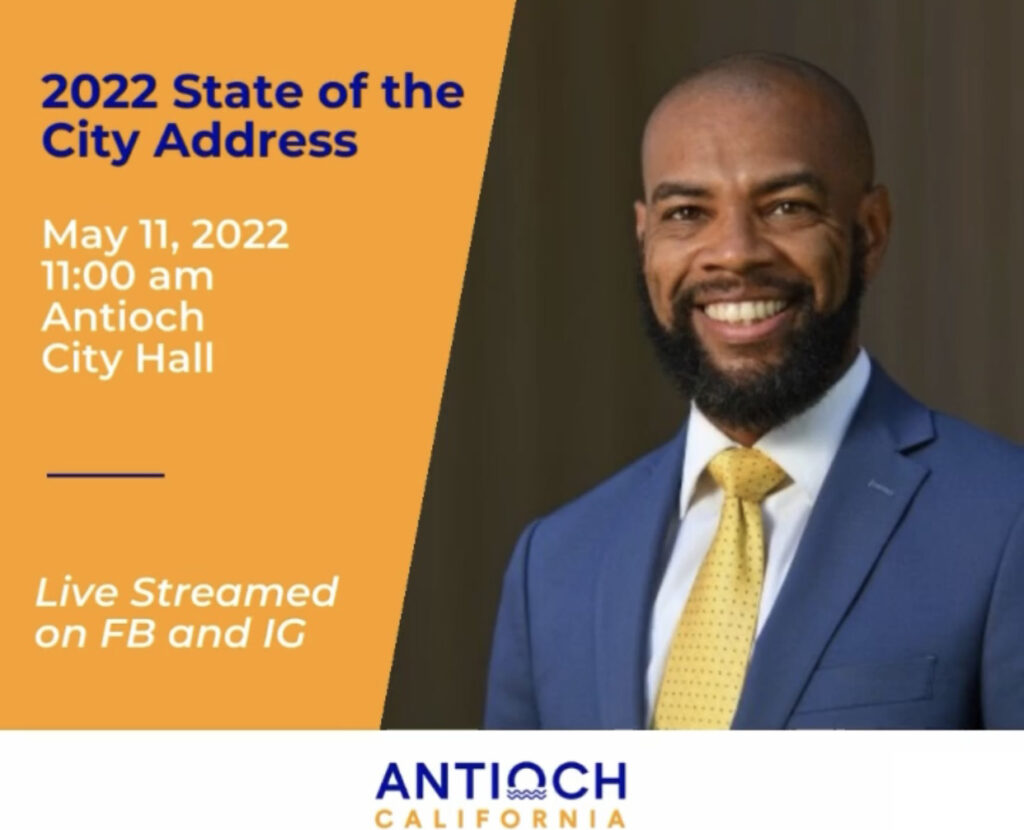Archive for the ‘City Council’ Category
Antioch City Treasurer takes council to task on spending including $12.3 million on homeless motel program
Sunday, May 8th, 2022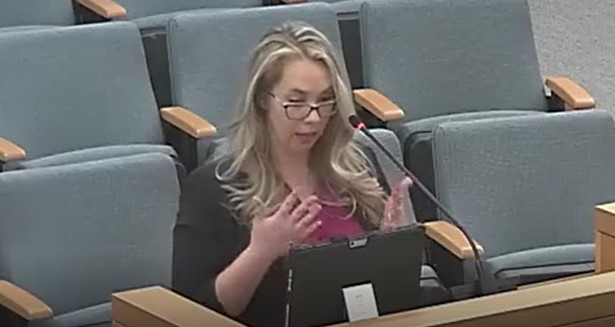
Antioch City Treasurer Lauren Posada speaks to the city council during public comments at the end of their meeting on Tuesday, April 26, 2022. Video screenshot.
“the City cannot continue to support each department to meet the demands while continuing to add expenses that depletes revenues” – Lauren Posada
By Allen D. Payton
During public comments at the end of the Antioch City Council meeting on Tuesday, April 26, City Treasurer Lauren Posada spoke out against the council’s spending.
Earlier in the meeting the council discussed spending $12.3 million over five years for the motel on East 18th Street to serve as transitional housing for the homeless, and the associated “wrap-around” support services.
During council discussion on the item District 3 Councilwoman Lori Ogorchock said, “I heard from Focus Strategies $12.3 million is conservative. When you look at the budget and transferring in from the state budget stabilization, 2025-26 there is no more money in the budget stabilization fund. So, our reserves will be depleted.”
Mayor Lamar Thorpe responded, “every budget assumption we get puts us in the red. We’ve been going bankrupt since the day we got here and 10 years later, we’re not bankrupt. Because these numbers don’t make all the assumptions that, as an example, generally our sales tax does better than we anticipate, so we get more money.”
“We don’t always factor in cannabis because we’re constantly getting new applications and we’re approving them, so that doesn’t take certain things into account,” he continued. “So, to look at this number as a fixed number is inaccurate. Because we never look at numbers like that because they’re assumptions, they’re not reality. They’re just assumptions so that we can plan for the future.”
A majority of council members supported the project, including Thorpe, and Councilwomen Tamisha Torres-Walker (District 1) and Monica Wilson (District 4). But Torres-Walker was not ready to move forward that night as she wanted additional information from staff and to consider other, additional locations in the city. So, combined with the opposition from Ogorchock and Mayor Pro Tem Mike Barbanica, a decision on spending $12.3 million on the motel program was postponed. (See related article) (The item is on the agenda for the council’s next meeting on Tuesday, May 10.)
Posada’s Comments (See video at 4:09:51 mark)
Asked if she had planned to share her thoughts before Thorpe made his comments that evening Posada said, “I did have a draft ready. But as the meeting went on, I did edit it. I was listening and I’m glad I waited.”
Reading from prepared remarks, Posada said, “Currently, at the City of Antioch we have under our umbrella – Administration offices, Animal Services, Community Development, Economic Development, Finance, Information Systems, Police, Public Works, and Recreation with various departments underneath. I would like to point out that Animal Services, Water Park, Youth Services, Unhoused Services and the Marina are unique entities to us as a city that we operate. All these departments require resources in order to operate effectively. We have one budget that is adopted bi-annually that we should utilize as a guideline to determine our scope or work.
I understand that year after year since 2012 has been an improvement coming off the previous housing crisis, but it would be a disservice if we continued to go off the notion that our revenues will always exceed our expenditures. There are many factors that are contributed to the budget and closing out each fiscal year – as examples we are taking into consideration the salary savings from our police department this year and the housing market continues to rise that will contribute to our projected revenues for this fiscal year. Each year is unique, but I am asking Council to be mindful of the times that we are in and listen to the warnings when they come.
Throughout this agenda packet there are comments made that I would like to bring up that concerned me regarding the fiscal impact with new budget expenditures:
‘…ongoing operations for the remainder of the regulatory period will need to be identified.’
‘This expenditure is currently unbudgeted and is proposed to be funded through the General Fund.’
‘…the need for a budget amendment would be evaluated in conjunction with the budget process and subject to City Council’s direction to staff.’
‘…budget for the Public Safety and Community Resources Department is not under consideration at this meeting. The City Council will have the opportunity to consider the budget for new positions, office space, supplies, and equipment in its upcoming consideration of the fiscal year budget.’
I am not taking the stance that I am for or against any item, but my ask is this: If we are going to pivot what we have underneath our umbrella as a City then I request that we are willing to have the difficult conversations that may come as a result of that pivot and determine funding sources upfront — the City cannot continue to support each department to meet the demands while continuing to add expenses that depletes revenues — I understand budget will be coming up midyear but it is so important to determine what is our priority and clearly outline that to our residents throughout upcoming agenda packets to alleviate frustration or misinformation if possible and most importantly for residents to be confident in decisions being made that will ultimately impact the future wellbeing of our City.
Thank you.”
————–
Asked later about her comments Posada said, “I was trying to bring understanding in a professional way. When you look at the agenda packets there should always be a clear funding source.”
“How can we have these conversations so that they can make an educated decision?” she asked. “How does this $12.3 million affect us over the years? But that’s just one decision. We have to look at the big picture.”
“I’m striving to keep fiscal responsibility at the forefront of Council – big decisions are being made that will impact our city,” Posada added.
Posada was elected city treasurer in 2020 for a four-year term. To see the City’s financial reports, visit www.antiochca.gov/administration-department/city-treasurer/ and to contact the city treasurer call (925) 779-7005 or email her at citytreasurer@antiochca.gov.
Following outcry from retailers Antioch Council agrees to suspend certain tobacco sales ban until December 1
Monday, May 2nd, 2022
Examples of flavored tobacco. Source: YTAPP presentation
Will wait for November vote on referendum of statewide ban; approves six-year contract extension for city attorney on 5-0 vote
By Allen D. Payton
After much outcry from tobacco retailers in Antioch, the city council on Tuesday night April 26, 2022, agreed to suspend their previously approved ban on the sale of some tobacco and vaping products through December 1. No vote was taken, so the ban remains in place, but city staff was directed to suspend enforcement.
In addition, the council voted unanimously to approve an unusual six-year extension to the contract with Smith. Normal contracts with city attorneys and managers are three-to-five years in length. City Attorney contract extension ACC042622
Tobacco Retail Ban Grace Period
The ban was approved on a 3-2 vote on Feb. 22, with Mayor Pro Tem Mike Barbanica and District 1 Councilwoman Tamisha Torres-Walker opposing. Tobacco Retail Sales Ban ACC022222
It was in response to an effort by Antioch youth seeking to keep flavored tobacco products from being sold to and used by young people. The Council previously considered this topic at its May 25, 2021, meeting during a detailed presentation of a survey by the Youth Tobacco Advocacy Policy Project (YTAPP). The ban went into effect on April 7, this year. YTAPP Presentation ACC052521
According to the city staff report for the April 26 council meeting agenda item, “Since passing the ordinance, the City Council has heard public comment from tobacco retailers and businesses selling tobacco products expressing the desire for a grace period temporarily suspending the implementation of new restrictions on sales of tobacco or tobacco products with characterizing flavor, electronic cigarettes, cigars, and little cigars to enable businesses to sell their existing inventory and transition into compliance with the new ordinance.”
One of the complaints from the retailers was that the city ordinance didn’t create a level playing field with those in neighboring cities. The council was asked to wait until after a November vote on a referendum on the state law passed in 2020 banning flavored tobacco products. According to the L.A. Times the statewide ban was suspended in January 2021 after the referendum by the tobacco industry qualified for the ballot.
Another complaint was that the ordinance didn’t give the retailers time to sell the products they already had in stock. A third complaint was that the retailers weren’t notified by the City of the impending ban or suspension of enforcement prior to either council meeting.
According to a report by the FDA, “Flavors are added to tobacco products to improve flavor and taste by reducing the harshness, bitterness, and astringency. However, the use of flavors in tobacco products raises important public health questions. For example, FDA is aware of early reports that some flavors could help adult cigarette smokers switch to potentially less harmful tobacco products. On the flip side, research has shown that sweet-tasting flavors are particularly appealing to youth and young adults.
In 2020, non-Hispanic Black high school students reported past 30-day cigar smoking at levels twice as high as their White counterparts. Nearly 74% of youth aged 12-17 who use cigars say they smoke cigars because they come in flavors they enjoy. Among youth who have ever tried a cigar, 68% of cigarillo users and 56% of filtered cigar users report that their first cigar was a flavored product. Moreover, in 2020, more young people tried a cigar every day than tried a cigarette.”
During the April 26 meeting the council gave direction to City Attorney Thomas L. Smith to prepare an amendment to the tobacco ordinance implementing a grace period until December 1, to focus on community education and suspend enforcement until the passage of the amendment to the ordinance.
Council Comments
District 3 Councilwoman Lori Ogorchock spoke in favor of the grace period to applause from the audience saying, “I’m looking for the businesses to make a real, concerted effort to make sure none of these flavored, menthol cigarettes get into the hands of kids. I hope there’s something you can do education-wise.”
“I was not in for this from the start,” Barbanica stated. “I didn’t support it. I think it harms our local businesses. Please continue to police yourself. But I’m in support of staying this until at least Dec. 1st until we see what the state does. I think this was an overreach on our part and we need to be consistent with state law and not harm our local businesses.”
While Mayor Lamar Thorpe said he could support the grace period he also stated, “But I will not be changing my mind irrespective of what the voters of California do. I’m sticking to what I originally did.”
District 4 Councilwoman Monica Wilson said she could also support the grace period but wanted to focus on a community education component. “Not sure about Dec. 1, but I can support the grace period.”
“I heard people say, ‘Big Tobacco, Big Tobacco’,” Torres-Walker said, speaking in support of the grace period. “This is not Big Tobacco sitting out here. They’re family-owned businesses.”
Advisory Notice Sent April 25
The following notice was sent by the City to businesses via email on Monday, April 25 providing details on the ban:
“ADVISORY NOTICE:
FOR BUSINESSES ENGAGED IN RETAIL SALES OF TOBACCO AND
VAPING PRODUCTS FOR USE WITH TOBACCO
This notice is to inform local businesses of recent changes to City ordinances impacting retail sales within the City of Antioch. The intent of the referenced policies is to provide a healthy, safe environment for all City residents by reducing the adverse effects of cigarettes and related tobacco products, especially as it relates to youth.
As of April 7, 2022, the following changes to the City of Antioch Municipal Code will become effective:
1. The number of new tobacco retailers shall be restricted.
- Tobacco retailers are prohibited from selling or possessing tobacco products with the characteristic of being “flavored”, including but not limited to mint, menthol or chocolate.
- New businesses with tobacco sales and vaping products for use with tobacco shall maintain a minimum distance of at least 1,000 feet from schools and similar uses.
- Electronic smoking devices and e-cigarettes for sale for use with tobacco or tobacco sales are banned in all retail establishments.
- A minimum package size for little cigars (cigarillos) is restricted to twenty and cigars is restricted to six.
- A minimum price of $10 per package, including applicable fees and taxes, is set for tobacco products, including cigarettes, little cigars (cigarillos) or cigars.
The City respectfully requests your cooperation. On a going forward basis, City of Antioch’s Code Enforcement Division will address compliance matters.
For additional background information, see items F and G at https://www.antiochca.gov/fc/government/agendas/CityCouncil/2022/agendas/030822/030822.pdf
Should you have questions regarding retail sales of tobacco and vaping products for use with tobacco, please contact the City of Antioch Community Development Department, Code Enforcement Division at 925.779.7042.”
Retailers who sell the products complained about the impact on their businesses and asked the council to wait until the vote on a November ballot measure was decided, that would create a statewide ban. The retailers wanted a level playing field. The council members agreed.”
The enforcement of the ordinance is currently suspended. The council is expected to vote on the grace period during their next meeting on Tuesday, May 10.
Mayor Thorpe’s and new interim chief’s police hiring incentive program and over hire proposals move forward
Wednesday, April 27th, 2022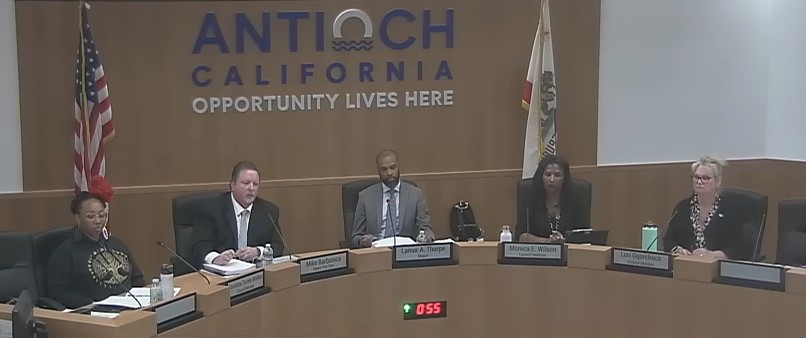
Antioch City Council during their meeting on Tuesday, April 26, 2022. Video screenshot from city website.
One day after new interim chief started in his position
By Allen D. Payton
During the Antioch City Council meeting on Tuesday night, April 26, 2022, hiring incentives and over hire by four additional sworn officers recently proposed by Mayor Lamar Thorpe and newly appointed Interim Police Chief Steve Ford to address the lack of active sworn police officers on the force, received the greenlight from fellow council members. The proposals were made during a press conference by the two of them on April 4 and appeared on the council agenda one day after Ford started in his new position and the day before his oath of office ceremony. (See related article)
Thorpe to Work with Staff on Additional Hiring Incentives for Police Officers
Police Captain Tony Morefield provided a presentation on the department’s current incentive program for recruiting police officers. APD Recruitment Signing Bonus Incentives staff report ACC042622
“A structured bonus incentive, similar to what we have currently only at a higher rate,” Thorpe said, describing his and Ford’s incentive proposal. “I’m also proposing it for academy grads, or a housing down payment.”
“Increasing that, I think we’re talking about a tremendous amount of money. I’m willing to go along with the current incentive program,” Mayor Pro Tem Mike Barbanica said. “I want people to work, here because they want to, not because they’re getting a signing bonus. I want people to live here, because they want to. Once their time period is up, they’re gone. I just think we should focus on retention.”
“I appreciate the vision of what is already in place…and that there’s already been an incentive program,” District 1 Councilwoman Tamisha Torres-Walker said. “I’m not sure if this is something I can support over the long-haul as I have some of the same concerns as Mayor Pro Tem Barbanica.”
“My proposal is a temporary measure, not a permanent measure,” Thorpe said.
“That’s what I’m saying, a temporary measure,” Torres-Walker said.
“We have to do whatever we can to recruit officers,” Thorpe stated.
I wouldn’t mind looking at other incentives that are out there…what other communities are doing, as well,” District 4 Councilwoman Monica Wilson said.
“I’m concerned about hiring quality officers. I don’t want incentives…that will attract officers who will leave,” District 3 Councilwoman Lori Ogorchock said.
“I also have a concern about officers who are already working here,” she continued. “We’re not incentivizing them to stay. I’d be looking at those possibilities.”
“If you’ll allow me to go back and work with the city attorney, our new chief and Captain Morefield and bring something back,” Thorpe said.
Both Torres-Walker and Barbanica said they could support that.
Ogorchock said she would support it if it included incentives for current officers.
“We need to look at that citywide. Human Resources is depleted,” Thorpe said. “I think the police department should be the focus.”
“I appreciate the direction to go back…and bring back a draft policy for us to look at,” he concluded.
Support Increasing Over Hire by Four More Officers to 10 Above 115 in Budget
Following another brief presentation by Morefield the council discussed Thorpe’s proposal to increase the over hire of officers from 121, as previously approved, to 125, which is 10 more than the 115 sworn police officers currently in the budget. Over Hire Sworn Police Officers staff report ACC042622
Barbanica said, “I support that.”
“There’s no timeline. No end date,” Ogorchock said.
“The problem is when you commit to hire officers, you have to have the funds to pay for them,” City Attorney Thomas L. Smith said.
“I’m not for over hiring 10, I’m for hiring 10,” Ogorchock said. “Actual hired employees.”
“That’s not this proposal,” Thorpe pointed out.
“I heard 115, then in my check in…I heard we already have approval to hire 121 and we’d only be requesting four,” Torres-Walker said.
“Correct, we’re asking for over hire of 10,” Thorpe said. “We did this in 2020. If we didn’t have funding for it, it goes away.”
“I will support the over hire of 10,” Torres-Walker then stated. “Do we understand what the fiscal impact is?”
“We can go back and figure that out and come back with a policy,” Thorpe said.
“I would agree, I’d like to see the permanent number go up by 10,” Barbanica said. “I support this. But it takes a long time to hire a police officer. We’re not going hire them overnight. This is a good measure to start.”
“OK. So, I think the direction is clear,” Thorpe said concluding the discussion.
Antioch City Council hires Bay Bridge engineering firm to design new Bicycle Garden
Tuesday, April 26th, 2022
Bicycle Garden rendering. Source: City of Antioch
Will locate it at Prewett Park; postpones vote on homeless motel funding due to lack of information from city staff; formation of new department also postponed
By Allen D. Payton
During their meeting Tuesday night, April 26, 2022, the Antioch City Council voted to postpone a vote on spending $12.3 million over five years to lease a motel for transitional housing for the city’s homeless residents. Mayor Lamar Thorpe spoke of holding a special meeting on the matter, possibly this Friday. The council also unanimously voted to approve up to $550,000 on the proposed Bicycle Garden and locate it at Prewett Family Park. At the end of their meeting, the council on a 2-2-1 split with Thorpe stating he would be abstaining, the formation of the proposed Department of Public Safety and Community Resources was postponed until issues being discussed about the matter in closed session are worked out
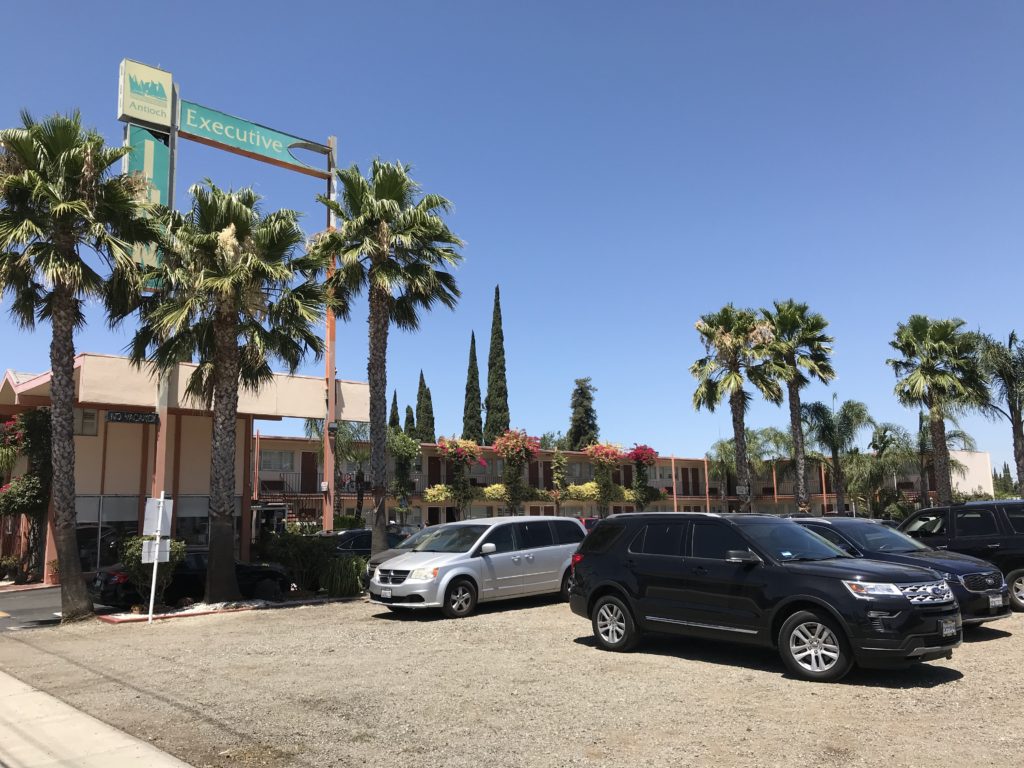
The Executive Inn on E. 18th Street is proposed to be used for transitional housing for homeless. Herald file photo.
Homeless Motel Funding Vote Postponed
Following public comments and a history about the project by Thorpe, the council members offered their reasons for how they were going to vote on approving $12.3 million to lease the Executive Inn on E. 18th Street for five years. Executive Inn Homekey Program staff report ACC042622 Executive Inn HomeKey Financing presentation ACC02622
“This is bridge housing for stability,” Thorpe said. “I don’t want people giving out misinformation about our decisions up here. People have told us that we couldn’t. But dammit, we’re doing it.”
Mayor Pro Tem Mike Barbanica said, “I’m in favor of getting people off the street. But I’m not in support of this location.”
“At $2.3 million that’s $82,000 per room per year. We’re only talking about 30 rooms,” he continued.
Barbanica then spoke of the impacts to the shopping center in Pittsburg where the Walmart store is located, since the Motel 6 on Loveridge Road was converted to the Delta Landing transitional housing facility for homeless in East County, and the need for more security there, as a result.
“We’re fooling ourselves if we think there won’t be other impacts in that neighborhood,” he said about the area around the Executive Inn.
District 1 Councilwoman Tamisha Torres-Walker mentioned she lives in the neighborhood near the motel.
“I don’t think having the Executive Inn converted to transitional housing will cause any more problems in that neighborhood,” she said. “If it was good enough to put a school there for children then we can house people there living on the street.” She was speaking of the Rocketship Delta Prep charter school on Cavallo Road.
“I would like to see efforts for beautification and safety in this neighborhood,” Torres-Walker continued. “I do think we should move forward with leasing the Executive Inn. I really want to support the application for HomeKey for the Executive Inn and other potential sites. I do agree this one site is not the end all be all. We do have time. The application doesn’t have to be in until October.”
“It is a topic we’ve been working on for a very long time. I believe that we should have a presentation from Dignity Moves…on other properties,” District 3 Councilwoman Lori Ogorchock said. “I have heard from Focus Strategies that $12.3 million is conservative. So, our reserves will be depleted. The $12.3 doesn’t include services. I’m not in favor of this site. I want to look at other opportunities.”
“The figure $12.2 does include wrap-around services,” Thorpe stated, correcting Ogorchock. “Every budget assumption has us going in the red. Generally, our sales tax does better than we project. So, to look at this number as a fixed number is an assumption.”
District 4 Councilwoman Monica Wilson spoke next saying, “People have said ‘why don’t we have services for homeless?’ We’ve had migration in the Bay Area, east. Services haven’t followed.”
“I’m in agreement we do need to look at other opportunities. But the cutoff date is coming up pretty soon. We shouldn’t leave money on the table,” she continued. “We have a second date coming up. But I don’t want to keep going ‘this isn’t a good site’. Nobody’s going to be 100% happy with any site we choose. I’m saying we should move forward with something, so we don’t leave money on the table. I’m for voting for this tonight so we get the ball rolling and not keep kicking the can down the road.”
“We’re not applying for Round 2 on May 2nd. That would be an impossible effort. We are applying for Round 3 funding…in October,” Thorpe explained.
Assistant City Manager Rosann Bayon Moore spoke about research that she could make available to the council members showing “the Executive Inn is the only site that can compete with the aggressive timeline. As soon as they make their decision in December, we have to show we can bring the units online within eight months.”
“I would have preferred to see that before this and that didn’t happen,” Torres-Walker said, referring to the research by city staff. “I would also like to hear from Dignity Moves and from Home First so we can have a balanced presentation and not just Focus Strategies. Tonight, I cannot support this item without that.”
“So, we need to postpone this,” Thorpe said. “We can’t kick this can down the road. We have to move. We can meet on Friday.”
Torres-Walker then made a motion to postpone the item and Wilson seconded it. “Most votes on homeless have been 3-2 votes,” Thorpe stated. “I keep hearing it’s about this reason or that reason. It’s values. I’m sick and tired of hearing the reasons.”
The motion to postpone then passed 4-1 with Barbanica voting against.

Bicycle Garden concept video screenshot. Source: City of Antioch
Bicycle Garden Design Funding & Location Approved
Antioch Parks and Recreation Director Brad Helfenberger provided a presentation on the proposed Bicycle Garden and said the Contra Costa Transportation Authority would be the lead agency on the project. Bicycle Garden staff report & presentation ACC042622
During discussion about the Bicycle Park, the council chose the location of Prewett Family Park for the Bicycle Garden and to spend up to $550,000 for planning and design by San Francisco-based T.Y. Lin International, the global civil and structural infrastructure engineering firm that designed the Eastern Span of the San Francisco-Oakland Bay Bridge. The funds are not currently in the budget but will be spent from the General Fund.
Council members were then asked their top two preferred locations. Torres-Walker and Barbanica supported Gentrytown Park as their first choice and Prewett Family Park as their second for the location. But Ogorchock, Wilson and Thorpe supported Prewett as their first choice and Gentrytown as their second choice.
“So, Prewett moves forward,” Thorpe said.
The council then approved the expenditure and location on a 5-0 vote.
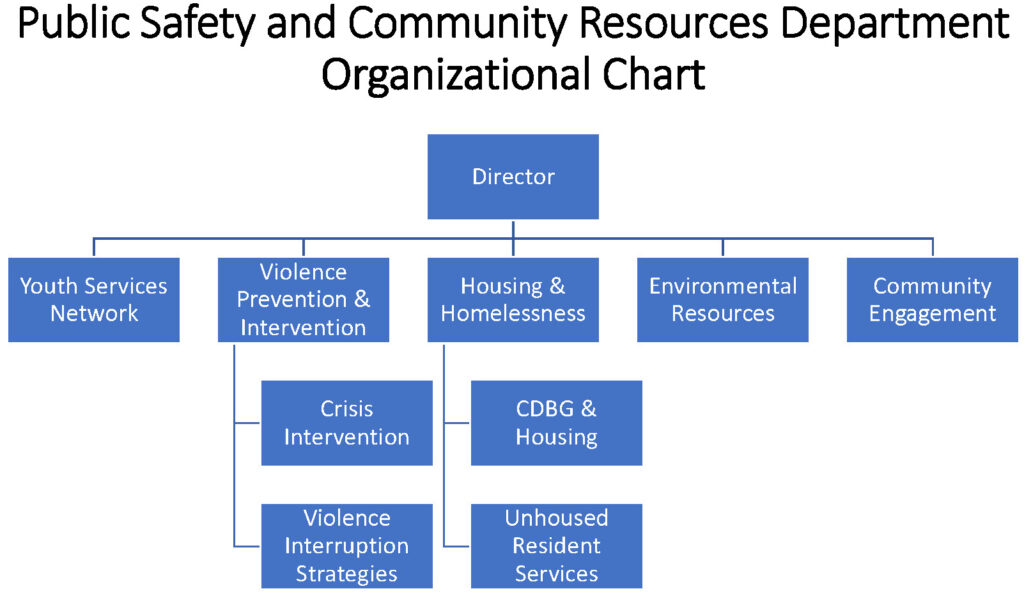
Proposed organizational chart for new city department. Source: City of Antioch
Formation of New Department Also Postponed
The council then discussed the formation of the proposed Department of Public Safety and Community Resources. (See related articles here and here) New department formation staff report ACC042622
Ogorchock asked to change the name to Public Services.
“As one of the committee members, of course I’m in support of this,” Wilson said.
“I would like to see this come back and have staff develop a policy on the Department of Public Safety and Community Resources,” Torres-Walker said. She also wanted the director’s position included in the ordinance.
“Not including it doesn’t mean you can’t hire one,” City Attorney Thomas L. Smith stated.
“Do we normally include the positions in an ordinance?” Thorpe asked.
“Sometimes we include the top positions. You don’t have to. You can leave it out.” Smith responded.
“I don’t think it needs to be in the ordinance. Staff needs flexibility. I think that’s too much,” Thorpe stated.
“If it doesn’t have to come back in the ordinance and can come back another way, through the budget, I’m fine with that,” Torres-Walker said.
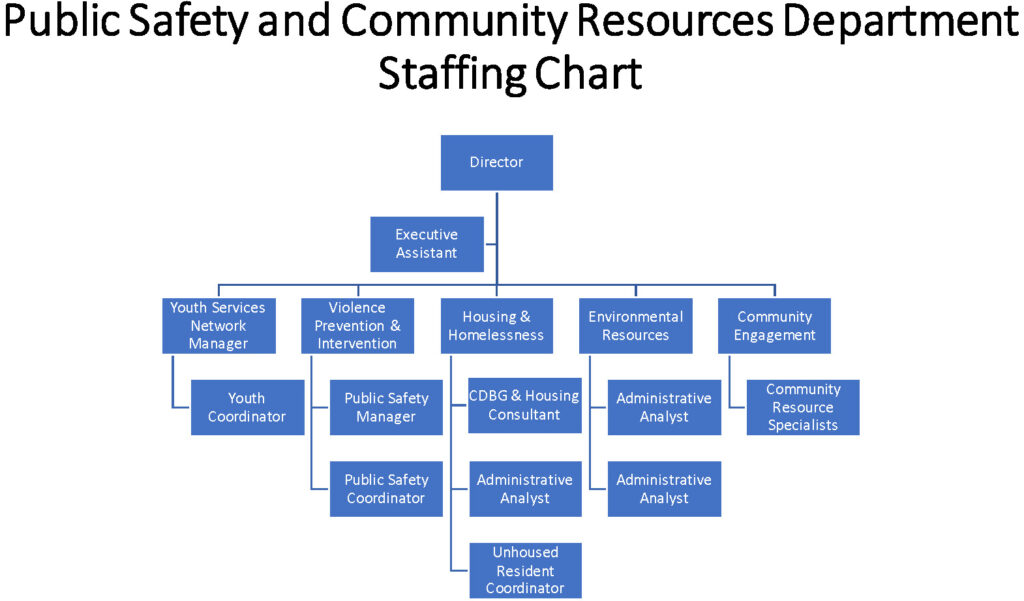
Proposed staffing chart for new city department. Source: City of Antioch
“I get what the mayor is saying. I’m happy to move this process forward,” Wilson said.
“So, everyone is in support of moving this forward?” Thorpe asked.
“I’ve been consistent ‘no’ on this,” Barbanica said.
“So, is that three in favor and two opposed?” Smith asked.
Thorpe said he was going to abstain.
“Should I bring the ordinance back?” Smith asked.
“We’ve been having these discussions in closed session. I’d prefer to get some of that worked out, first then bring it back,” Thorpe said.
So, the formation of the new department was postponed until an unspecified time in the future.
Antioch Mayor Thorpe possibly violating state campaign finance law not filing report for his recall committee
Tuesday, April 19th, 2022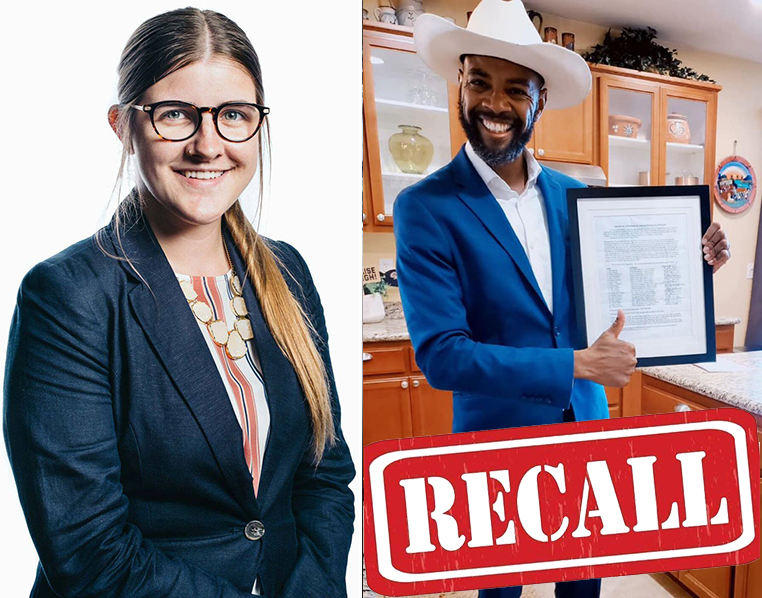
Antioch City Clerk Ellie Householder and Mayor Lamar Thorpe with his framed recall petition.
City Clerk Householder said he didn’t have to; FPPC filing schedule shows it was due on January 31. He could face $5,000 penalty; complaints filed by Antioch residents
“it is the responsibility of any and every public official to know their filing requirements and to fulfill them” – Jay Wierenga, Communications Director, California Fair Political Practices Commission
By Allen D. Payton
Antioch Mayor Lamar Thorpe is possibly in violation of state campaign finance laws for not filing the required semi-annual report for his recall committee which was due January 31. City Clerk Ellie Householder, who is also facing possible recall, has said he didn’t have to. However, according to the California Fair Political Practices Commission that’s incorrect.
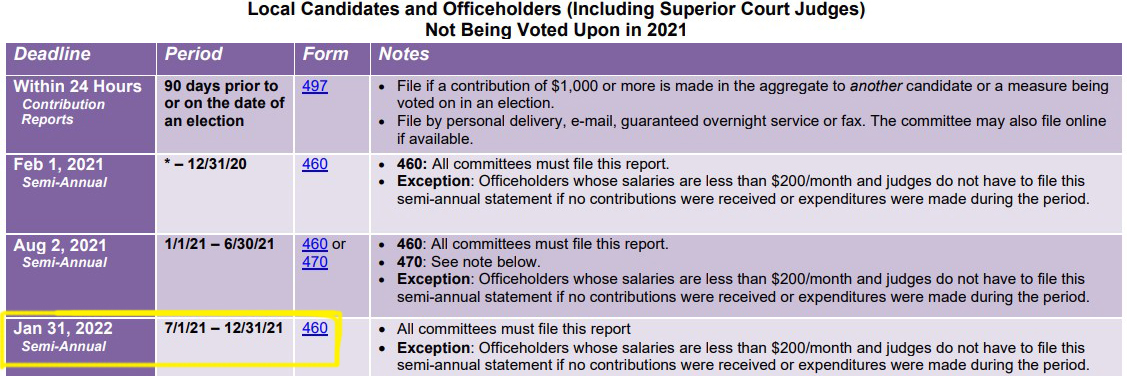
The filing schedule for Local Candidates and Officeholders (Including Superior Court Judges) Not Being Voted Upon in 2021 shows Thorpe’s recall committee 460 report was due on Jan. 31, 2022. Source: FPPC – highlight added
The latest report, known as a 460 form, is supposed to show all of a campaign’s contributions, loans and expenses for the period of July 1 through Dec. 31, 201. 2021_07_LCL_Officeholders_Not_on_Ballot
Thorpe formed his committee to beat the recall by submitting his 410 form on Dec. 9, 2021. That form is not required to be filed until a campaign has raised or spent at least $2,000. Thorpe 410 from SOS_001
Thorpe has boasted on social media that he’s raised $84,000 to beat the recall. But without the report his contributors have not been disclosed to the public.
An emailed request was made to Householder for copies of Thorpe’s semi-annual 460 campaign finance reports, through Dec. 31, 2021, for both his 2020 mayoral committee and his committee to beat the recall. Neither had been posted on the city’s website as of Friday, March 11.
At a community event the next day, Householder told this reporter, “we have them. We just haven’t posted them, yet.” She was asked to provide copies by the following Monday. But they were not.
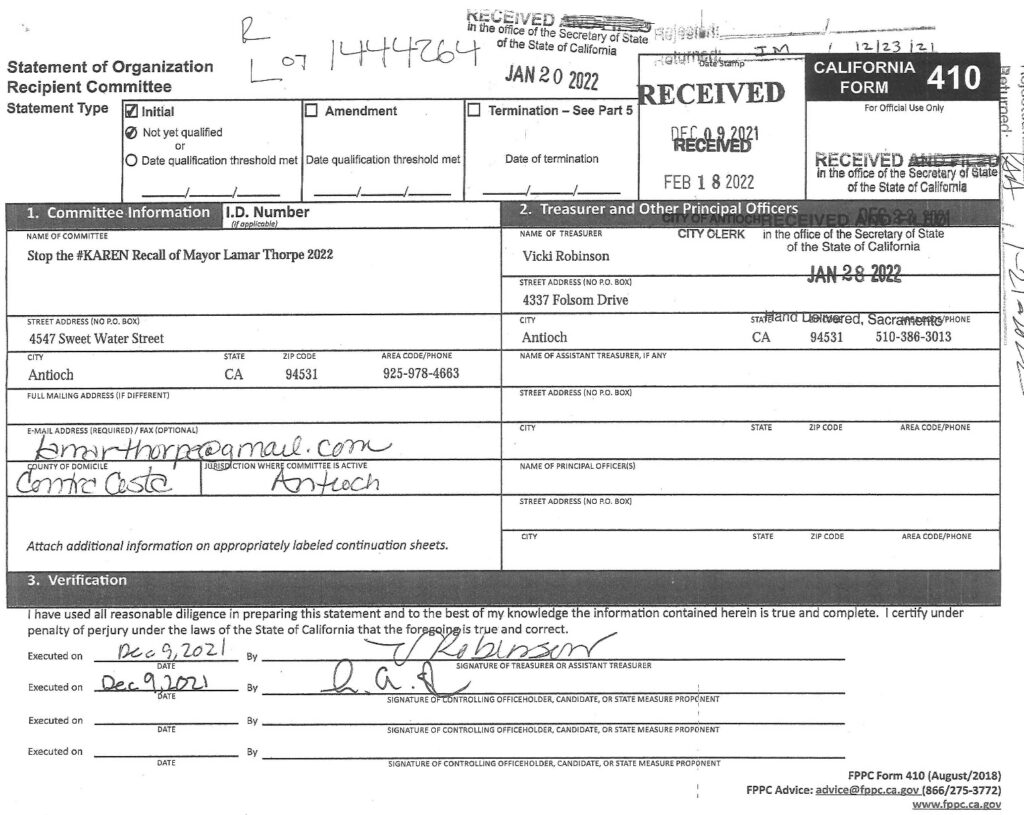
Stop the #KAREN Recall of Lamar Thorpe 2022 Form 410 page 1. Source: Antioch City Clerk
A call was then made to Deputy City Clerk Christina Garcia asking for copies of the reports.
“Ellie said she has them. They were submitted to her,” Garcia said. “I have not seen them. I was off a couple of days. So, if she received them, it may have happened while I was out. She has them with her. I don’t know where. I don’t have them, here in my office. I can have access to them. But for now, she’s handling all the FPPC stuff for the office. I’m handling all the other day-to-day. She has to learn the software and teach people how to learn the software. There’s been a glitch which is getting worked out.”
As of Friday, March 18, the forms were still not on the city clerk’s website. Subsequently, an email was sent to Householder, Thorpe and Garcia with the following: “as of today, they are still not on the city’s website – City of Antioch Electronic Filing System (netfile.com) nor have I received copies of them via email. Now, today I’m told that Lamar’s campaign treasurer hasn’t completed them, yet and he hasn’t submitted them to your office. Which is true? Do you have them? If so, please email me copies, today and upload them to the website, today. Or if necessary, I can pick up hard copies, today.”
Thorpe was asked in the same email,” if you haven’t yet submitted your 460’s for both committees, why not? When will you?”
No responses were received.
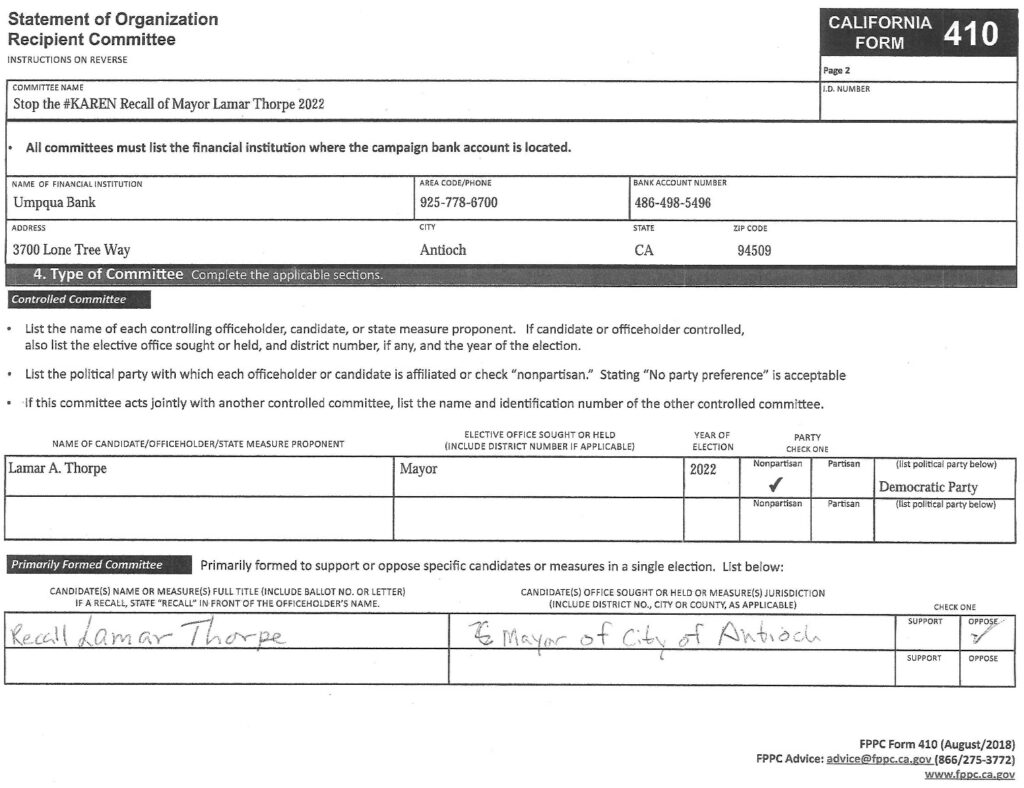
Stop the #KAREN Recall of Lamar Thorpe 2022 Form 410 page 2. Source: Antioch City Clerk
On Monday, March 21 another email was sent to all three with the following: “Please see below the questions I sent you on Friday afternoon, because Lamar’s 460’s for both his 2020 mayoral campaign committee and beat the recall committee, nor his 410 for the latter committee are on the city’s website are still not there, as of today.
If they have been submitted to the City Clerk’s Office, I want copies of them, today, please. No more delays. If you don’t yet have them, Lamar when will you or your campaign treasurer, if it’s someone other than you, submit them?”
Householder responded via email the next day with copies of Thorpe’s 410 form for his recall committee and 460 for his 2020 Mayor’s campaign committee. But the latter form shows no contributions or loans received or expenditures made between July 1 and Dec. 31, 2021. Thorpe for Mayor 2020_460_7121 to 123121
“I appreciate your patience while I resolved technical issues with NetFile; both the 410 and 460 are viewable/downloadable. For convenience, I have also attached them to this email,” she wrote. “Please note there is no 460 for the ‘Stop the #KAREN Recall of Lamar Thorpe 2022’ because one is not due yet.”
In response, an email was sent to Householder and Garcia asking, “since his recall committee was formed on Dec. 9, 2021, shouldn’t his 460 report for any activity prior to Dec. 31, 2021 have been due on Jan. 31, 2022?”
Householder responded that same day writing, “No. You can find the filing schedule for all campaign committees here: https://www.fppc.ca.gov/learn/campaign-rules/where-and-when-to-file-campaign-statements/when-to-file-campaign-statements-state-local-filing-schedules.html”
A search of that website shows multiple campaign finance report filing schedules. As a result an email was sent to both Householder and Garcia that same evening with the following:
“This looks like the correct one under the 2021 Filing Schedules since there was no election in 2021, Lamar formed his committee and filed his 410 in 2021 and it required a report by Jan. 31, 2022
Local Candidates and Officeholders (Including Superior Court Judges) Not Being Voted Upon in 2021
That reads:
Jan 31, 2022 Semi-Annual 7/1/21 – 12/31/21 460 • All committees must file this report • Exception: Officeholders whose salaries are less than $200/month and judges do not have to file this semi-annual statement if no contributions were received or expenditures were made during the period.
It further reads:
Form 460: Candidates who have raised/spent $2,000 or more file the Form 460. The Form 410 (Statement of Organization) must also be filed once $2,000 or more has been raised/spent.
Why would Lamar form his committee and file his 410 on Dec. 9 if he hadn’t already raised or spent a least $2,000 by then?
If that’s not the correct schedule which one is that you are following for Lamar’s recall, please?”
No response was received. That email was resent on Friday, March 25 with, “I’m resending that last email since you didn’t respond and answer my question about which reporting schedule you are following for Lamar Thorpe’s recall committee. I don’t see any others that apply other than the one I read and shared.”
Still no response was received.
Householder was then asked in person which reporting schedule she is following. She replied, “that’s for you to research.”
Fair Political Practices Commission Spokesman Says 460 Report Due Jan. 31 for Committee Formed Before Dec. 31, 2021
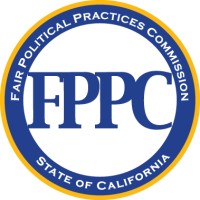 According to information provided by Jay Wierenga, Communications Director for the state Fair Political Practices Commission, the city clerk is wrong based on the filing schedule that applies.
According to information provided by Jay Wierenga, Communications Director for the state Fair Political Practices Commission, the city clerk is wrong based on the filing schedule that applies.
Questions were sent to him on Wed., April 6 asking, “which schedule on that page is the correct one for a council member facing possible recall and formed his committee to raise funds to beat it prior to the end of last year? Also, if she is wrong about this and hasn’t required him to file in a timely manner, what consequences are there for each of them? Finally, if so, can the oversight of his recall election process be removed from her and be given to the Deputy City Clerk, as is being done with Householder’s recall election process?”
Wierenga responded the next day writing, “I will get back to you to try to determine the proper filing schedule. One thing I can say it is the responsibility of any and every public official to know their filing requirements and to fulfill them. Any violation of the Political Reform Act can result in a penalty of up to $5,000 per violation. Committee treasurers are also responsible for the committees they serve as treasurers.”
Later that same day he wrote, “I/we are not going to comment on any one, specific person/group/situation. I want to make that very clear that this is not a comment on any one person or group. Generally speaking, and for anyone who qualified as a committee before 12/31/21, then a Form 460 was required to be filed by 1/31/22.”
For clarification Wierenga was then asked, “Since what you wrote is ‘generally speaking’ are there any exceptions other than what is written on that filing schedule? – ‘Officeholders whose salaries are less than $200/month and judges do not have to file this semi-annual statement if no contributions were received or expenditures were made during the period.’ If so, what are those exceptions, please?”
He responded, “the words on the schedule are… the words on the schedule. As for me saying ‘generally speaking’, it is because I/we are doing just that. We are not commenting on any one person or group or specific situation.”

Thorpe recall committee report filing as of April 19, 2022 at 5:45 pm. Source: City Clerk’s website screenshot.
Thorpe and each of the council members are paid $1,600 per month by the city in their positions.
4/21/22 UPDATE: To further clarify the FPPC’s position, on Thursday, April 21, Wierenga wrote, “I, we (the FPPC) are not accusing anyone publicly (or even privately) of violating the law. ONLY an investigation by the proper investigative agency (which is the FPPC Enforcement Division, which investigates complaints, alleged violations, etc. or occasionally a District Attorney or the Attorney General’s Office, both of which also have jurisdiction under the Political Reform Act as it is State law) can legally determine a violation.”
Questions for Thorpe, Householder Go Unanswered, Still No Report Posted
On Monday, April 18 at 5:51 p.m. Wieringa’s emails were forward to Thorpe and Householder. They were asked, “Have you filed it, yet? As of today, it’s not on the city’s website. Just the 410 form. Campaign Finance Statements – City of Antioch, California (antiochca.gov) If so, and it’s just not yet uploaded, can one of you please provide me a copy?”
Thorpe was asked specifically, “If not, when will you be filing it?”
No responses were received as of Tuesday, April 19 at 5:45 PM. As of that time Thorpe’s recall committee form 460 was still not on the city clerk’s campaign finance statements page of the city’s website.
4/25/22 UPDATE: According to a resident who chose to remain anonymous, at least two and possibly three complaints have been filed with the FPPC Enforcement Division. One was filed on April 11 with ID# COM-04112022-01033 and another on April 16 with ID# COM-04172022-01087. To file a complaint visit https://fppc.ca.gov/enforcement/electronic-complaint-system.html.
Antioch Council to consider renaming A Street after city’s first Black resident in the 1800’s instead of Rivertown Drive
Monday, April 18th, 2022During special meeting Tuesday night; also will consider renaming L Street to Veterans Blvd.; when to have the police chief’s 2020 & 2021 annual reports; forming Human Rights and Racial Equity Committee; policy on censuring council members; administrative assistants for council members; three more items – but no votes, just discussions
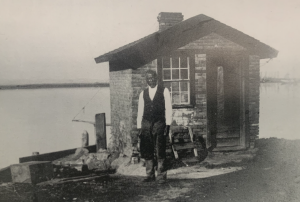
Thomas Gaines. Source: City of Antioch
By Allen D. Payton
During a special meeting Tuesday night, April 19, 2022, the Antioch City Council will consider renaming A Street to Thomas Gaines Blvd., after the city’s first Black resident in the 1800’s, instead of Rivertown Drive to help promote the historic downtown on the Highway 4 signs. In addition, the council will consider a list of other items for only discussion and direction to staff, each of which would have to be brought back at a future council meeting for vote, except for deciding when to have the police chief’s annual reports for 2020 and 2021. (Please see below)
Rivertown Drive
The city’s 1996 Economic Development Plan included changing G Street to Rivertown Drive for permanent promotion of the city’s historic downtown on the freeway signs, just like renaming the north side of Somersville Road to Auto Center Drive was done to promote the auto dealerships was done for economic development purposes. But when the on-ramps and off-ramps to G Street were removed with the widening of Highway 4 the plan changed to renaming A Street to Rivertown Drive.
Gaines has already been recognized with a day, last year by the city council and with the Thomas Gaines K-8 Virtual Academy by the school board. (See related articles here and here)
Questions for Council, City Staff
The following questions were emailed on Saturday morning to the city council members, interim city manager and Economic Development Director Kwame Reed. However, Reed’s auto response message shows he’s out of the office until Thursday, April 21.
“While naming a street after Thomas Gaines, the city’s first Black resident, is nice, how will renaming A Street accomplish the economic development goal of permanently promoting Rivertown on Hwy 4?”
District 1 Councilwoman Tamisha Torres-Walker was asked, “how will that benefit one of the business areas in your district?”
District 4 Councilwoman Monica Wilson was reminded and asked, “the last time this came before the council you said you wanted to survey the residents, first to get their input about renaming A Street. Was that done?”
Additional questions were asked of all seven including, “Has a survey been done of the business and property owners along A Street and in Rivertown to get their input? As someone has suggested, might you instead consider renaming the west side of Laurel Road to Thomas Gaines Blvd. as it’s about to open and connect to Hillcrest and still rename A Street to Rivertown Drive as planned?”
Only Ogorchock Responds
District 3 Councilwoman Lori Ogorchock was the only one to respond writing, “I do not know of any surveys that were completed focusing the changing of the name of A St., and or any other street.”
“As to the area west of Laurel, not sure that is befitting,” she continued. “Maybe when and if there is development downtown we should consider naming a street after him or possibly the ‘lot’ if it is ever truly being looked at as a park. There are a lot of ideas that could work, but all should be in the downtown area.” Ogorchock was referring to the former Antioch Lumber Company lot between W. 2nd, W. 3rd and E Streets where the Rivertown Square park and event center has been proposed.
Agenda Items
- CITY OF ANTIOCH HUMAN RIGHTS AND RACIAL EQUITY COMMITTEE
- EMERGENCY OPERATIONS CENTER (EOC) TECHNOLOGY UPGRADES
- POLICE CHIEF’S REPORT ON 2020 AND 2021 CRIME AND ANTIOCH POLICE DEPARTMENT UPDATE
- CREATION OF A BEACH PARK FROM RIVERVIEW LODGE TO THE MARINA (Note: The restaurant, open since November, is now known as Monica’s Riverview).
- YOUTH APPRECIATION DAY
- VETERANS’ BOULEVARD COMMUNITY PROJECT/ L STREET RENAMING PRESENTATION
- NAMING OF NEW STREETS IN DEVELOPMENTS AND NAMING A STREET THOMAS GAINES BOULEVARD
- POLICY ON CENSURE OF CITY COUNCIL MEMBERS (TO INCLUDE REMOVAL FROM COMMISSIONS)
- ADMINISTRATIVE ASSISTANTS FOR CITY COUNCIL MEMBERS
Viewing Meeting & Public Comments
City Council meetings are televised live on Comcast channel 24, AT&T U-verse channel 99, or live stream at City Council Meeting LIVE – City of Antioch, California (antiochca.gov).
The public has the opportunity to address the City Council on each agenda item. No one may speak more than once on an agenda item or during “Public Comments”.
Members of the public wishing to provide public comments, may do so in one of the following ways (#2 pertains to the Zoom Webinar Platform):
- IN PERSON Fill out a Speaker Request Form, available near the entrance doors, and place in the Speaker Card Tray near the City Clerk before the City Council Meeting begins.
- VIRTUAL To provide oral public comments during the meeting, please click the following link to register in advance to access the meeting via Zoom Webinar: https://www.antiochca.gov/speakers
You will be asked to enter an email address and a name. Your email address will not be disclosed to the public. After registering, you will receive an email with instructions on how to connect to the meeting.
When the Mayor announces public comments, click the “raise hand” feature in Zoom. For instructions on using the “raise hand” feature in Zoom, visit: https://www.antiochca.gov/raise_hand. When calling into the meeting using the Zoom Webinar telephone number, press *9 on your telephone keypad to raise
your hand. Please ensure your Zoom client is updated so staff can enable your microphone when it is your turn to speak.
Speakers will be notified shortly before they are called to speak. When you are called to speak, please limit your comments to the time allotted (350 words, up to 3 minutes, at the discretion of the Mayor).
The City cannot guarantee that its network and/or the site will be uninterrupted.
- WRITTEN PUBLIC COMMENT If you wish to provide a written public comment, you may do so in one of the following ways by 3:00 p.m. the day of the City Council Meeting:
(1) Fill out an online speaker card, located at https://www.antiochca.gov/speaker_card,
Or (2) Email the City Clerk’s Department at cityclerk@ci.antioch.ca.us.
Please note: Written public comments received by 3:00 p.m. the day of the City Council Meeting will be shared with the City Council before the meeting, entered into the public record, retained on file by the City Clerk s Office, and available to the public upon request. Written public comments will not be read during the City Council Meeting.
Antioch non-profit leaders not happy new city department will displace 16 Rivertown Resource Center organizations
Monday, April 18th, 2022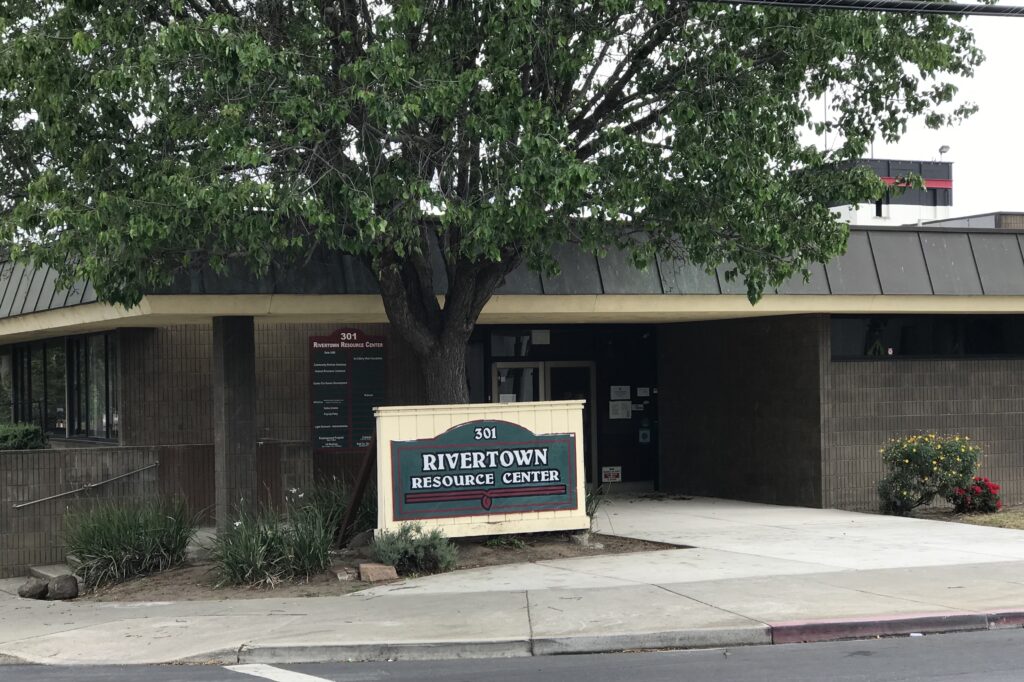
The Rivertown Resource Center which houses 16 non-profit organizations on the corner of W. 10th and D Street is the former location of the Antioch Police Department. Photos: Allen D. Payton
Primary leader, Betty Smith recently honored as Antioch Citizen of the Year for Lifetime Achievement; pay property taxes but don’t have to according to County Assessor
By Allen D. Payton
During the Antioch City Council meeting on Tuesday, April 12, 2022, three long-time community leaders and volunteers spoke out against the city council and staff locating the new Public Safety and Community Resources Department at the Rivertown Resource Center on W. 10th Street (See related article)
One of those leaders is Betty Smith who was recently honored by the Antioch Chamber of Commerce as the 2021 Antioch Citizen of the Year for Lifetime Achievement. (See related article)
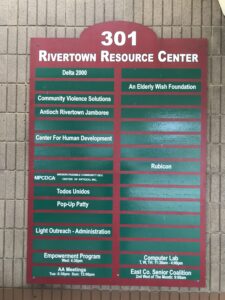
An incomplete tenants list on the wall near the front entrance.
The organizations located at the Rivertown Resource Center that will be displaced are Delta 2000, Community Violence Solutions, Antioch Rivertown Jamboree, Center for Human Development, An Elderly Wish Foundation, East County Senior Coalition, Pop Up-Patty, Rivertown Community Radio, Eden Council for Hope and Opportunity (ECHO) Housing, Todos Unidos, Family Purpose/Casual Recovery, Mission Possible Community Development Center of Antioch (MPCDCA), Kiwanis Club of the Delta-Antioch, Empowerment Program: Supporting LGBTQ Youth, Prison-From-The Inside-Out, and Village Keepers African American Wellness Center.
“The Delta 2000 Rivertown Resource Center’s mission is to facilitate coordination of services between public, private and community groups to create a healthy and safe community for Contra Costa County,” said Betty Smith reading from prepared remarks, while visibly emotional. “Delta 2000 continues to be the leading resource agency in East County dedicated to increasing the effectiveness and impact of the nonprofit sector by providing technical assistance and support, coordination resource development programs, conduction needs assessments and assisting community-based organizations serving the East County Region. Delta 2000 offers support services which allow groups to focus on the work of providing vital services.”
“For over 33 years Delta 2000 has assisted more than 86 grassroots organizations to incorporate…and pursue a 501c3 tax exempt status from the IRS,” she stated.
Former Antioch mayor and current Antioch School Board Trustee Mary Rocha spoke next, saying, “I was at the meeting where the city manager plus five department heads were present to let us know that it was possible that they would take over the Rivertown Resource Center to locate five future programs they want to develop.”
“My question is why displace 16 non-profits that support the community when the City has a large empty building at the Nick Rodriguez Center?” she asked. “The Senior Center is located in a small portion of that large building and the building is operated by the city. You could consider using parts of that building for your employees’ needs. The programs the City would like to create would be beneficial to seniors at this location and surrounding community.”
“I think you need to reconsider,” Rocha added.
“I’m on the board and use the services at the Rivertown Resource Center,” said Bill Chapman. “We’ve had 10 unidentified staff tour the building and not one of them displayed a business card.”
“They taped a message on our front door and said they were going to inspect our exits,” he continued. “They came and took pictures of every room and every item in each room. I request we get a copy of (Interim City Manager) Cornelius Johnson’s report so we can put in our two cents.”
“You can’t produce one document,” Chapman stated. “We had to produce a copy of all our leases and within 24 hours. We did that.”
“What do we get to say on our side?” he asked. “The building is safe. We need a place where our volunteers can go after 5:00 p.m. because many of them work other jobs.”
Questions for City Staff, Council Members
In an email Wednesday morning, April 13 Interim City Manager Con Johnson, all five council members and Assistant City Manager Rosanna Bayon Moore were asked the following questions:
“Is what the three representatives of Delta 2000 and the Rivertown Resource Center, Mary Rocha, Betty Smith and Bill Chapman, said at last night’s council meeting correct, that the city is planning to use that building for the new Department of Public Safety and Community Resources and displace 16 non-profit organizations?
If so, what is the timeframe and how much notification are you going to give the organizations?
When do you plan to launch the two new services – mental health crisis response and violence intervention and prevention? When are you planning on moving them and the other five services into the Rivertown Resource Center?
When are you planning on hiring the director for the new department? Do you already have someone in mind for the position?
Has the city considered as Mary Rocha suggested, using the Nick Rodriguez Community Center instead?”
They were then asked if what Chapman said about how city staff treated them is true. “If so, is that the way long-time community leaders and volunteers should be treated?”
Councilwoman Torres-Walker was specifically asked, “As a non-profit organization leader, is this how you and your organization would want to be treated? Were you aware that the new department would use the Rivertown Resource Center and displace 16 non-profits? Was that part of your plan when you proposed the new department? If not, what will you do to help those organizations and address their concerns?”
They were all also asked, “Since staff for four of the five responsibilities of the new department – which excludes one which can’t be relocated, Animal Services – are currently located at either City Hall or the Antioch Community Center, isn’t there space at either of those buildings for the new department head and coordinators of the two new divisions?
Is the new department really necessary since five of the responsibilities are currently handled by other, existing city departments? Why not just put the two new divisions at the PD and leave the others where they are and hire a coordinator at a much lower cost?”
Ogorchock Only One to Respond
“I will tell you it is,” in response to question if it’s true what the leaders. “If you listen to the meeting before last the mayor said something about this building being used as the new center. I then said there has been no further discussion regarding the use of this building for this purpose, it has not been brought back to council for consideration, he flat out said this is the spot! I guess he knows he has the votes for this to happen.”
Regarding the timeframe and notification to the organizations, she replied, “I have no clue as again as this item has not come back before council to discuss.”
Regarding launching the two new services Ogorchock wrote, “We do not have a vendor for the mental health crisis response as of yet and the other has not been discussed.”
As for when the director for the new department, she responded, “I am not sure on this one either. I believe that the ad-hoc committee is to bring back to council the vision, values and scope to council for discussion, but who knows?”
In response to the question if the city has considered using the Nick Rodriguez Community Center instead, the District 3 councilwoman responded, “Nope, and they (3) are not looking at any other spot.
Bill Chapman said, ‘We’ve had 10 unidentified staff tour the building and not one of them displayed a business card. They taped a message on our front door and said they were going to inspect our exits. They came and took pictures of every room and every item in each room. We had to produce a copy of all our leases and within 24 hours.’ He is correct, they have had several individuals going through the building. None of which have given a business card to be in the building other than to say we are here to look at the premises. What Mr. Bill is talking about is there was a meeting a week ago where 6 staff, Con, Thomas, Rosanna, John, Forrest and Tasha were all present. Why so many, you got me. Mr. Bill asked Con for a card, he said he was just at an event and he handed out all of his cards! Then he asked Thomas who just flat out said I don’t have any on me, then Rosanna stepped up to the plate and handed out her cards.”
“It is sad that they are booting out the very organizations that this new department is supposed to help. Is that not an oxymoron?” Ogorchock continued.
Regarding space at either City Hall or the Antioch Community Center for the new department head and coordinators of the two new divisions, the councilwoman replied, “There is, but the 3 want a new dept.”
To the final questions about the necessity for the new department, placing the two new divisions at the PD and hiring a coordinator at a much lower cost Ogorchock wrote, “I’ve been asking this question all along. I have no clue other than this is what Tamisha wants and since they all vote for each other’s items, is that to be considered a quid-pro-quo? This is a misuse of taxpayers’ dollars if you ask me.”
No other responses were received as of Monday, April 18 at 4:30 p.m.
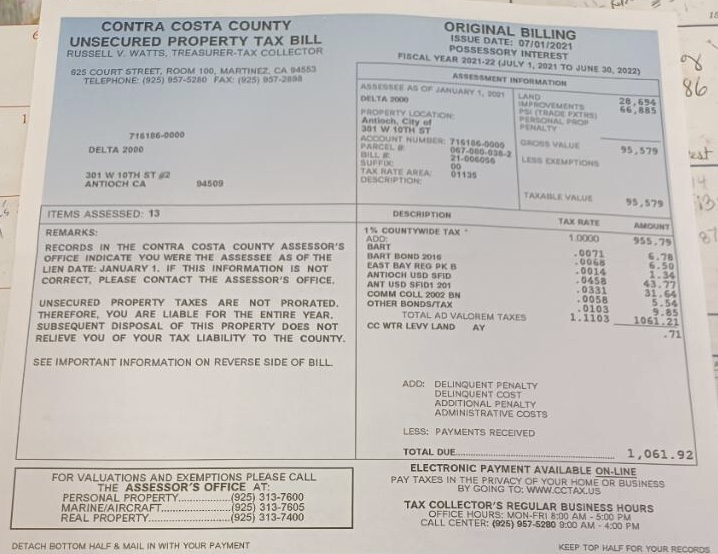
Delta 2000 property tax bill 2021-22. Source: Betty Smith
Delta 2000 Paying Property Taxes But Doesn’t Have To
Delta 2000 pays an annual Unsecured Property Tax bill for use of the building of $1,061.92 based on an assessment of $95,579.
Questions were sent Friday, April 15 to County Assessor Gus Kramer and County Tax Collector Russell Watts asking, why they are being charged property taxes and do all government owned buildings pay property taxes.
Watts forwarded the email to County Auditor-Controller Bob Campbell,
“This is a Possessory Interest Bill,” Campbell replied. “The City owns the property but a portion of the property, as determined by the Assessor, isn’t used for a qualifying not taxable or tax-exempt status.”
However, Kramer responded, “All the non-profits have to do is apply for an exemption as a non-profit with the assessor’s office and they will not get a bill.”
He later added that the non-profits have to file their exemption paperwork with the federal government, as well.











